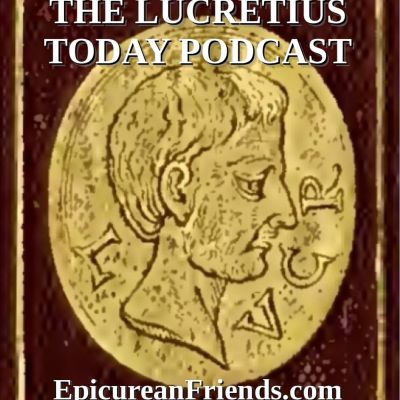Lucretius Today is a podcast dedicated to learning Epicurean philosophy through study of the poet Lucretius, who lived in the age of Julius Caesar and wrote "On The Nature of Things," the only complete presentation of Epicurus' ideas left to us from the ancient world. We'll walk you line by line through the six books of Lucretius' poem, and we'll discuss how Epicurean philosophy can apply to you today. In this podcast we won't be talking about modern political issues. How you apply Epicurus in your own life is entirely up to you. Over at the Epicureanfriends.com web forum, we apply this approach by following a set of ground rules we call "Not Neo-Epicurean, But Epicurean." Epicurean philosophy is not a religion, it''s not Stoicism, it's not Humanism, it's not Libertarianism, it's not Atheism, and it's not Marxism or any other philosophy - it is unique in the history of Western Civilization, and as we explore Lucretius's poem you'll quickly see how that is the case. The home page of this podcast is LucretiusToday...
http://Epicureanfriends.com
Episode 142 - Diogenes of Oinoanda (Part 2) "Reality"
Welcome to Episode One Hundred Forty-Two of Lucretius Today. This is a podcast dedicated to the poet Lucretius, who wrote "On The Nature of Things," the only complete presentation of Epicurean philosophy left to us from the ancient world. I am your host Cassius, and together with our panelists from the EpicureanFriends.com forum, we'll walk you through the ancient Epicurean texts, and we'll discuss how Epicurean philosophy can apply to you today. We encourage you to study Epicurus for yourself, and we suggest the best place to start is the book "Epicurus and His Philosophy" by Canadian professor Norman DeWitt. If you find the Epicurean worldview attractive, we invite you to join us in the study of Epicurus at EpicureanFriends.com, where you will find a discussion thread for each of our podcast episodes and many other topics.
This week we return to Diogenes of Oinanda and we examine fragments relating to the nature of reality, and Epicurus' difference of opinion with Democritus on the subject. Now let's read today's text, fragments 5, 6, and 7 as translated by Martin Ferguson Smith:
Fr. 5
[Others do not] explicitly [stigmatise] natural science as unnecessary, being ashamed to acknowledge [this], but use another means of discarding it. For, when they assert that things are inapprehensible, what else are they saying than that there is no need for us to pursue natural science? After all, who will choose to seek what he can never find? Now Aristotle and those who hold the same Peripatetic views as Aristotle say that nothing is scientifically knowable, because things are continually in flux and, on account of the rapidity of the flux, evade our apprehension. We on the other hand acknowledge their flux, but not its being so rapid that the nature of each thing [is] at no time apprehensible by sense-perception. And indeed [in no way would the upholders of] the view under discussion have been able to say (and this is just what they do [maintain] that [at one time] this is [white] and this black, while [at another time] neither this is [white nor] that black, [if] they had not had [previous] knowledge of the nature of both white and black.
Fr. 6 [As for the first bodies, also] called elements, which on the one hand have subsisted from the beginning [and] are indestructible, and [on the other hand] generate things, we shall explain what [they are] after we have demolished the theories of others. Well, Heraclitus of Ephesus identified fire as elemental, Thales of Miletus water, Diogenes of Apollonia and Anaximenes air, Empedocles of Acragas fire and air and water and earth, Anaxagoras of Clazomenae the homoeomeries of each thing, and the Stoics matter and God. As for Democritus of Abdera, he did well to identify atoms as elemental, but since his conception of them was in some respects mistaken, he will be considered in the exposition of our theories. Now we shall bring charges against the said men, not out of contentiousness towards them, but because we wish the truth to be safeguarded; and we shall deal with Heraclitus first, since he has been placed first on our list. You are mistaken, Heraclitus, in saying that fire is elemental, for neither is it indestructible, since we observe it being destroyed, nor can it generate things...
Fr. 7 Even Democritus erred in a manner unworthy of himself when he said that atoms alone among existing things have true reality, while everything else exists by convention. For, according to your account, Democritus, it will be impossible for us even to live, let alone discover the truth, since we shall be unable to protect ourselves from either fire or slaughter or [any other force].
